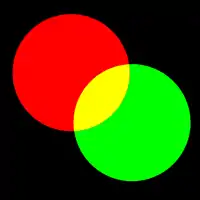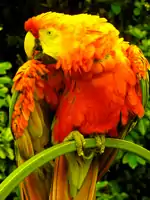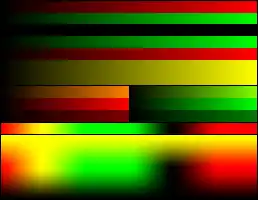RG color space
The RG or red-green color space is a color space that uses only two colors, red and green. It is an additive format, similar to the RGB color model but without a blue channel. Thus, blue is said to be out of gamut. This format is not in use today, and was only used on two-color Technicolor and other early color processes for films; by comparison with a full spectrum, its poor color reproduction made it undesirable. The system cannot create white naturally, and many colors are distorted.


RG color space
Any color containing a blue color component can't be replicated accurately in the RG color space. There is a similar color space called RGK which also has a black channel. Outside of a few low-cost high-volume applications, such as packaging and labelling, RG and RGK are no longer in use because devices providing larger gamuts such as RGB and CMYK are in widespread use. Until recently, its primary use was in low-cost light-emitting diode displays, where red and green tended to be far more common than the still nascent blue LED technology, though full-color LEDs with blue have become more common in recent years.
ColorCode 3-D, a stereoscopic color scheme, uses the RG color space to simulate a broad spectrum of color in one eye; the blue portion of the spectrum transmits a black-and-white (black-and-blue) image to the other eye to give depth perception.



Additive RG Additive RG color palette
See also
- Color theory
- List of colors
- List of film formats
- List of color film systems
- Imbibition
- Dye-transfer process
- List of early color feature films
- rg chromaticity
References
- Even Proportional Color Triangle
- Cinematographic Multiplex Projection, &c. U.S. Patent No. 1,391,029, filed Feb. 20, 1917.
- "Moving Pictures in Color", The New York Times, February 22, 1917, p. 9.
- The First Successful Color Movie", Popular Science, Feb. 1923, p. 59.
- filmmakeriq.com, The History and Science of Color Film: From Isaac Newton to the Coen Brothers